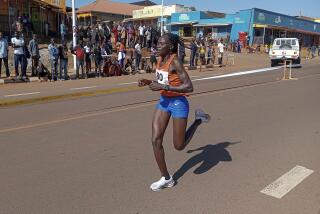Nigerian Runner Is Killed When Hit by Car in Sydney
- Share via
A Nigerian runner who had been training with his nation’s Olympic team was killed when struck by a car Thursday night in western Sydney, according to broadcast reports.
Hyginus Anugo, 22, a promising 200- and 400-meter runner who had participated in the World Junior Championships in 1996 in Sydney, was hit as he crossed a street, the official Olympic News Service said.
“He was a very quiet person, an easygoing person,” Nigerian Coach Brown Ebewele told the Japanese news agency Kyodo. “When the news got to us, everybody was shocked.”
Sydney’s Channel Seven television said Anugo was killed while running to catch a bus, but Kyodo reported Anugo was killed while heading back to his room at Southern Cross Bible College.
International Olympic Committee President Juan Antonio Samaranch sent a condolence note to the Nigerian team.
*
If the drug vials found in his baggage prove to be human growth hormone, an Uzbekistan Olympic team official could face expulsion from the Sydney Games and severe legal penalties in Australia.
Chemical analysis of the substance, labeled in English as the banned performance-enhancing drug HGH, was expected to be completed today.
Olympic official Jacques Rogge identified the official as a member of the 58-person Uzbekistan team.
Under Australian law, a person caught illegally importing a performance-enhancing drug into the country could face a maximum penalty of five years in prison and a $57,000 fine.
*
A report financed by the White House office of national drug policy has issued a stinging rebuke to the IOC as ineffectively combating the pervasive use of performance-enhancing drugs, according to a story in today’s New York Times.
The 107-page report says the IOC failed to establish a sufficiently independent body to administer an anti-doping campaign and cites allegations that the IOC interfered with research on drug testing. The report also says some coaches and athletes estimate as many as 80% of participants in some Olympic sports use performance-enhancing drugs.
*
At least 10 athletes have recorded suspected positive tests for banned drugs in out-of-competition controls before the Games.
Those cases have arisen since the World Anti-Doping Agency began conducting unannounced tests in April as part of a new effort to weed out drug cheats, WADA secretary general Harry Salvasamy said.
One athlete, an unidentified cyclist from Britain, has officially been confirmed as positive, while the others are still under investigation for “indications of possible positive or irregular results,” Salvasamy said.
The world agency was set up by the IOC this year to coordinate a global system of no-notice out-of-competition testing, considered the most effective way of catching drug users.
*
Tennis star Gustavo Kuerten will join Brazil’s Olympic team after sponsors compromised on a dispute that nearly kept him out of the Games.
Kuerten’s personal sponsor, Italy’s Diadora, and the Brazilian Olympic Committee agreed that Kuerten’s Olympic uniform will not display any trademarks, unless he wins a medal, in which case, he would wear a uniform provided by the team’s official sponsor, sportswear manufacturer Olympikus.
*
Lisa Leslie had 23 points and 11 rebounds as the U.S. women’s basketball team routed Poland, 86-39, in Adelaide, Australia, in its next-to-last Olympic tuneup. Sheryl Swoopes (sprained ankle) and Teresa Edwards (hip pointer) sat out the game. . . . John Cotton went two for three and drove in four runs as the U.S. Olympic baseball team defeated Italy, 11-2, in its pre-Olympic exhibition opener. . . . NBC has sold a record $900 million in commercial time on its Sydney Olympics coverage and expects to make a small profit. The network would not specify the projected profit. . . . Pilots using Sydney’s international airport have been warned to be wary of bogus radio transmissions on control tower frequencies.
More to Read
Go beyond the scoreboard
Get the latest on L.A.'s teams in the daily Sports Report newsletter.
You may occasionally receive promotional content from the Los Angeles Times.






